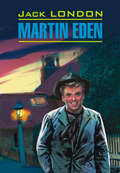
Джек Лондон
The Sea Wolf
CHAPTER XXXIIII
We waited all day for Wolf Larsen to come ashore. It was an intolerable period of anxiety. Each moment one or the other of us cast expectant glances toward the Ghost. But he did not come. He did not even appear on deck.
“Perhaps it is his headache,” I said. “I left him lying on the poop. He may lie there all night. I think I’ll go and see.”
Maud looked entreaty at me.
“It is all right,” I assured her. “I shall take the revolvers. You know I collected every weapon on board.”
“But there are his arms, his hands, his terrible, terrible hands!” she objected. And then she cried, “Oh, Humphrey, I am afraid of him! Don’t go-please don’t go!”
She rested her hand appealingly on mine, and sent my pulse fluttering. My heart was surely in my eyes for a moment. The dear and lovely woman! And she was so much the woman, clinging and appealing, sunshine and dew to my manhood, rooting it deeper and sending through it the sap of a new strength. I was for putting my arm around her, as when in the midst of the seal herd; but I considered, and refrained.
“I shall not take any risks,” I said. “I’ll merely peep over the bow and see.”
She pressed my hand earnestly and let me go. But the space on deck where I had left him lying was vacant. He had evidently gone below. That night we stood alternate watches, one of us sleeping at a time; for there was no telling what Wolf Larsen might do. He was certainly capable of anything.
The next day we waited, and the next, and still he made no sign.
“These headaches of his, these attacks,” Maud said, on the afternoon of the fourth day; “Perhaps he is ill, very ill. He may be dead.”
“Or dying,” was her afterthought when she had waited some time for me to speak.
“Better so,” I answered.
“But think, Humphrey, a fellow-creature in his last lonely hour.”
“Perhaps,” I suggested.
“Yes, even perhaps,” she acknowledged. “But we do not know. It would be terrible if he were. I could never forgive myself. We must do something.”
“Perhaps,” I suggested again.
I waited, smiling inwardly at the woman of her which compelled a solicitude for Wolf Larsen, of all creatures. Where was her solicitude for me, I thought,-for me whom she had been afraid to have merely peep aboard?
She was too subtle not to follow the trend of my silence. And she was as direct as she was subtle.
“You must go aboard, Humphrey, and find out,” she said. “And if you want to laugh at me, you have my consent and forgiveness.”
I arose obediently and went down the beach.
“Do be careful,” she called after me.
I waved my arm from the forecastle head and dropped down to the deck. Aft I walked to the cabin companion, where I contented myself with hailing below. Wolf Larsen answered, and as he started to ascend the stairs I cocked my revolver. I displayed it openly during our conversation, but he took no notice of it. He appeared the same, physically, as when last I saw him, but he was gloomy and silent. In fact, the few words we spoke could hardly be called a conversation. I did not inquire why he had not been ashore, nor did he ask why I had not come aboard. His head was all right again, he said, and so, without further parley, I left him.
Maud received my report with obvious relief, and the sight of smoke which later rose in the galley put her in a more cheerful mood. The next day, and the next, we saw the galley smoke rising, and sometimes we caught glimpses of him on the poop. But that was all. He made no attempt to come ashore. This we knew, for we still maintained our night-watches. We were waiting for him to do something, to show his hand, so to say, and his inaction puzzled and worried us.
A week of this passed by. We had no other interest than Wolf Larsen, and his presence weighed us down with an apprehension which prevented us from doing any of the little things we had planned.
But at the end of the week the smoke ceased rising from the galley, and he no longer showed himself on the poop. I could see Maud’s solicitude again growing, though she timidly-and even proudly, I think-forbore a repetition of her request. After all, what censure could be put upon her? She was divinely altruistic, and she was a woman. Besides, I was myself aware of hurt at thought of this man whom I had tried to kill, dying alone with his fellow-creatures so near. He was right. The code of my group was stronger than I. The fact that he had hands, feet, and a body shaped somewhat like mine, constituted a claim which I could not ignore.
So I did not wait a second time for Maud to send me. I discovered that we stood in need of condensed milk and marmalade, and announced that I was going aboard. I could see that she wavered. She even went so far as to murmur that they were non-essentials and that my trip after them might be inexpedient. And as she had followed the trend of my silence, she now followed the trend of my speech, and she knew that I was going aboard, not because of condensed milk and marmalade, but because of her and of her anxiety, which she knew she had failed to hide.
I took off my shoes when I gained the forecastle head, and went noiselessly aft in my stocking feet. Nor did I call this time from the top of the companion-way. Cautiously descending, I found the cabin deserted. The door to his state-room was closed. At first I thought of knocking, then I remembered my ostensible errand and resolved to carry it out. Carefully avoiding noise, I lifted the trap-door in the floor and set it to one side. The slop-chest, as well as the provisions, was stored in the lazarette, and I took advantage of the opportunity to lay in a stock of underclothing.
As I emerged from the lazarette I heard sounds in Wolf Larsen’s state-room. I crouched and listened. The door-knob rattled. Furtively, instinctively, I slunk back behind the table and drew and cocked my revolver. The door swung open and he came forth. Never had I seen so profound a despair as that which I saw on his face,-the face of Wolf Larsen the fighter, the strong man, the indomitable one. For all the world like a woman wringing her hands, he raised his clenched fists and groaned. One fist unclosed, and the open palm swept across his eyes as though brushing away cobwebs.
“God! God!” he groaned, and the clenched fists were raised again to the infinite despair with which his throat vibrated.
It was horrible. I was trembling all over, and I could feel the shivers running up and down my spine and the sweat standing out on my forehead. Surely there can be little in this world more awful than the spectacle of a strong man in the moment when he is utterly weak and broken.
But Wolf Larsen regained control of himself by an exertion of his remarkable will. And it was exertion. His whole frame shook with the struggle. He resembled a man on the verge of a fit. His face strove to compose itself, writhing and twisting in the effort till he broke down again. Once more the clenched fists went upward and he groaned. He caught his breath once or twice and sobbed. Then he was successful. I could have thought him the old Wolf Larsen, and yet there was in his movements a vague suggestion of weakness and indecision. He started for the companion-way, and stepped forward quite as I had been accustomed to see him do; and yet again, in his very walk, there seemed that suggestion of weakness and indecision.
I was now concerned with fear for myself. The open trap lay directly in his path, and his discovery of it would lead instantly to his discovery of me. I was angry with myself for being caught in so cowardly a position, crouching on the floor. There was yet time. I rose swiftly to my feet, and, I know, quite unconsciously assumed a defiant attitude. He took no notice of me. Nor did he notice the open trap. Before I could grasp the situation, or act, he had walked right into the trap. One foot was descending into the opening, while the other foot was just on the verge of beginning the uplift. But when the descending foot missed the solid flooring and felt vacancy beneath, it was the old Wolf Larsen and the tiger muscles that made the falling body spring across the opening, even as it fell, so that he struck on his chest and stomach, with arms outstretched, on the floor of the opposite side. The next instant he had drawn up his legs and rolled clear. But he rolled into my marmalade and underclothes and against the trap-door.
The expression on his face was one of complete comprehension. But before I could guess what he had comprehended, he had dropped the trap-door into place, closing the lazarette. Then I understood. He thought he had me inside. Also, he was blind, blind as a bat. I watched him, breathing carefully so that he should not hear me. He stepped quickly to his state-room. I saw his hand miss the door-knob by an inch, quickly fumble for it, and find it. This was my chance. I tiptoed across the cabin and to the top of the stairs. He came back, dragging a heavy sea-chest, which he deposited on top of the trap. Not content with this he fetched a second chest and placed it on top of the first. Then he gathered up the marmalade and underclothes and put them on the table. When he started up the companion-way, I retreated, silently rolling over on top of the cabin.
He shoved the slide part way back and rested his arms on it, his body still in the companion-way. His attitude was of one looking forward the length of the schooner, or staring, rather, for his eyes were fixed and unblinking. I was only five feet away and directly in what should have been his line of vision. It was uncanny. I felt myself a ghost, what of my invisibility. I waved my hand back and forth, of course without effect; but when the moving shadow fell across his face I saw at once that he was susceptible to the impression. His face became more expectant and tense as he tried to analyze and identify the impression. He knew that he had responded to something from without, that his sensibility had been touched by a changing something in his environment; but what it was he could not discover. I ceased waving my hand, so that the shadow remained stationary. He slowly moved his head back and forth under it and turned from side to side, now in the sunshine, now in the shade, feeling the shadow, as it were, testing it by sensation.
I, too, was busy, trying to reason out how he was aware of the existence of so intangible a thing as a shadow. If it were his eyeballs only that were affected, or if his optic nerve were not wholly destroyed, the explanation was simple. If otherwise, then the only conclusion I could reach was that the sensitive skin recognized the difference of temperature between shade and sunshine. Or, perhaps,-who can tell?-it was that fabled sixth sense which conveyed to him the loom and feel of an object close at hand.
Giving over his attempt to determine the shadow, he stepped on deck and started forward, walking with a swiftness and confidence which surprised me. And still there was that hint of the feebleness of the blind in his walk. I knew it now for what it was.
To my amused chagrin, he discovered my shoes on the forecastle head and brought them back with him into the galley. I watched him build the fire and set about cooking food for himself; then I stole into the cabin for my marmalade and underclothes, slipped back past the galley, and climbed down to the beach to deliver my barefoot report.
CHAPTER XXXIV
“It’s too bad the Ghost has lost her masts. Why we could sail away in her. Don’t you think we could, Humphrey?”
I sprang excitedly to my feet.
“I wonder, I wonder,” I repeated, pacing up and down.
Maud’s eyes were shining with anticipation as they followed me. She had such faith in me! And the thought of it was so much added power. I remembered Michelet’s “To man, woman is as the earth was to her legendary son; he has but to fall down and kiss her breast and he is strong again.” For the first time I knew the wonderful truth of his words. Why, I was living them. Maud was all this to me, an unfailing, source of strength and courage. I had but to look at her, or think of her, and be strong again.
“It can be done, it can be done,” I was thinking and asserting aloud. “What men have done, I can do; and if they have never done this before, still I can do it.”
“What? for goodness’ sake,” Maud demanded. “Do be merciful. What is it you can do?”
“We can do it,” I amended. “Why, nothing else than put the masts back into the Ghost and sail away.”
“Humphrey!” she exclaimed.
And I felt as proud of my conception as if it were already a fact accomplished.
“But how is it possible to be done?” she asked.
“I don’t know,” was my answer. “I know only that I am capable of doing anything these days.”
I smiled proudly at her-too proudly, for she dropped her eyes and was for the moment silent.
“But there is Captain Larsen,” she objected.
“Blind and helpless,” I answered promptly, waving him aside as a straw.
“But those terrible hands of his! You know how he leaped across the opening of the lazarette.”
“And you know also how I crept about and avoided him,” I contended gaily.
“And lost your shoes.”
“You’d hardly expect them to avoid Wolf Larsen without my feet inside of them.”
We both laughed, and then went seriously to work constructing the plan whereby we were to step the masts of the Ghost and return to the world. I remembered hazily the physics of my school days, while the last few months had given me practical experience with mechanical purchases. I must say, though, when we walked down to the Ghost to inspect more closely the task before us, that the sight of the great masts lying in the water almost disheartened me. Where were we to begin? If there had been one mast standing, something high up to which to fasten blocks and tackles! But there was nothing. It reminded me of the problem of lifting oneself by one’s boot-straps. I understood the mechanics of levers; but where was I to get a fulcrum?
There was the mainmast, fifteen inches in diameter at what was now the butt, still sixty-five feet in length, and weighing, I roughly calculated, at least three thousand pounds. And then came the foremast, larger in diameter, and weighing surely thirty-five hundred pounds. Where was I to begin? Maud stood silently by my side, while I evolved in my mind the contrivance known among sailors as “shears.” But, though known to sailors, I invented it there on Endeavour Island. By crossing and lashing the ends of two spars, and then elevating them in the air like an inverted “V,” I could get a point above the deck to which to make fast my hoisting tackle. To this hoisting tackle I could, if necessary, attach a second hoisting tackle. And then there was the windlass!
Maud saw that I had achieved a solution, and her eyes warmed sympathetically.
“What are you going to do?” she asked.
“Clear that raffle,” I answered, pointing to the tangled wreckage overside.
Ah, the decisiveness, the very sound of the words, was good in my ears. “Clear that raffle!” Imagine so salty a phrase on the lips of the Humphrey Van Weyden of a few months gone!
There must have been a touch of the melodramatic in my pose and voice, for Maud smiled. Her appreciation of the ridiculous was keen, and in all things she unerringly saw and felt, where it existed, the touch of sham, the overshading, the overtone. It was this which had given poise and penetration to her own work and made her of worth to the world. The serious critic, with the sense of humour and the power of expression, must inevitably command the world’s ear. And so it was that she had commanded. Her sense of humour was really the artist’s instinct for proportion.
“I’m sure I’ve heard it before, somewhere, in books,” she murmured gleefully.
I had an instinct for proportion myself, and I collapsed forthwith, descending from the dominant pose of a master of matter to a state of humble confusion which was, to say the least, very miserable.
Her hand leapt out at once to mine.
“I’m so sorry,” she said.
“No need to be,” I gulped. “It does me good. There’s too much of the schoolboy in me. All of which is neither here nor there. What we’ve got to do is actually and literally to clear that raffle. If you’ll come with me in the boat, we’ll get to work and straighten things out.”
“‘When the topmen clear the raffle with their clasp-knives in their teeth,’” she quoted at me; and for the rest of the afternoon we made merry over our labour.
Her task was to hold the boat in position while I worked at the tangle. And such a tangle-halyards, sheets, guys, down-hauls, shrouds, stays, all washed about and back and forth and through, and twined and knotted by the sea. I cut no more than was necessary, and what with passing the long ropes under and around the booms and masts, of unreeving the halyards and sheets, of coiling down in the boat and uncoiling in order to pass through another knot in the bight, I was soon wet to the skin.
The sails did require some cutting, and the canvas, heavy with water, tried my strength severely; but I succeeded before nightfall in getting it all spread out on the beach to dry. We were both very tired when we knocked off for supper, and we had done good work, too, though to the eye it appeared insignificant.
Next morning, with Maud as able assistant, I went into the hold of the Ghost to clear the steps of the mast-butts. We had no more than begun work when the sound of my knocking and hammering brought Wolf Larsen.
“Hello below!” he cried down the open hatch.
The sound of his voice made Maud quickly draw close to me, as for protection, and she rested one hand on my arm while we parleyed.
“Hello on deck,” I replied. “Good-morning to you.”
“What are you doing down there?” he demanded. “Trying to scuttle my ship for me?”
“Quite the opposite; I’m repairing her,” was my answer.
“But what in thunder are you repairing?” There was puzzlement in his voice.
“Why, I’m getting everything ready for re-stepping the masts,” I replied easily, as though it were the simplest project imaginable.
“It seems as though you’re standing on your own legs at last, Hump,” we heard him say; and then for some time he was silent.
“But I say, Hump,” he called down. “You can’t do it.”
“Oh, yes, I can,” I retorted. “I’m doing it now.”
“But this is my vessel, my particular property. What if I forbid you?”
“You forget,” I replied. “You are no longer the biggest bit of the ferment. You were, once, and able to eat me, as you were pleased to phrase it; but there has been a diminishing, and I am now able to eat you. The yeast has grown stale.”
He gave a short, disagreeable laugh. “I see you’re working my philosophy back on me for all it is worth. But don’t make the mistake of under-estimating me. For your own good I warn you.”
“Since when have you become a philanthropist?” I queried. “Confess, now, in warning me for my own good, that you are very consistent.”
He ignored my sarcasm, saying, “Suppose I clap the hatch on, now? You won’t fool me as you did in the lazarette.”
“Wolf Larsen,” I said sternly, for the first time addressing him by this his most familiar name, “I am unable to shoot a helpless, unresisting man. You have proved that to my satisfaction as well as yours. But I warn you now, and not so much for your own good as for mine, that I shall shoot you the moment you attempt a hostile act. I can shoot you now, as I stand here; and if you are so minded, just go ahead and try to clap on the hatch.”
“Nevertheless, I forbid you, I distinctly forbid your tampering with my ship.”
“But, man!” I expostulated, “you advance the fact that it is your ship as though it were a moral right. You have never considered moral rights in your dealings with others. You surely do not dream that I’ll consider them in dealing with you?”
I had stepped underneath the open hatchway so that I could see him. The lack of expression on his face, so different from when I had watched him unseen, was enhanced by the unblinking, staring eyes. It was not a pleasant face to look upon.
“And none so poor, not even Hump, to do him reverence,” he sneered.
The sneer was wholly in his voice. His face remained expressionless as ever.
“How do you do, Miss Brewster,” he said suddenly, after a pause.
I started. She had made no noise whatever, had not even moved. Could it be that some glimmer of vision remained to him? or that his vision was coming back?
“How do you do, Captain Larsen,” she answered. “Pray, how did you know I was here?”
“Heard you breathing, of course. I say, Hump’s improving, don’t you think so?”
“I don’t know,” she answered, smiling at me. “I have never seen him otherwise.”
“You should have seen him before, then.”
“Wolf Larsen, in large doses,” I murmured, “before and after taking.”
“I want to tell you again, Hump,” he said threateningly, “that you’d better leave things alone.”
“But don’t you care to escape as well as we?” I asked incredulously.
“No,” was his answer. “I intend dying here.”
“Well, we don’t,” I concluded defiantly, beginning again my knocking and hammering.






